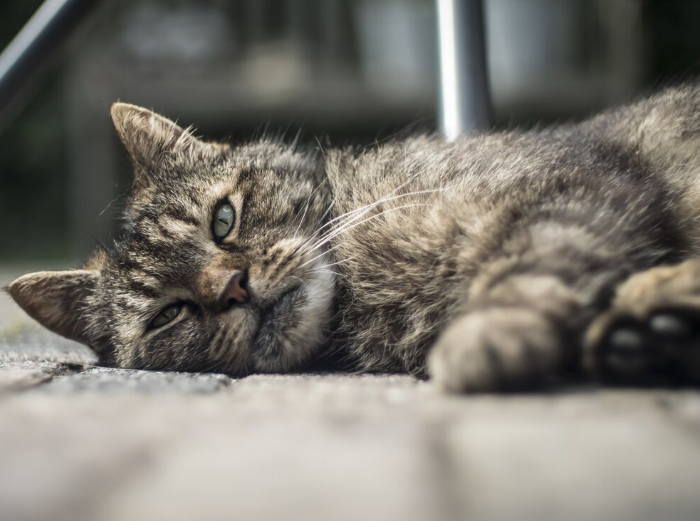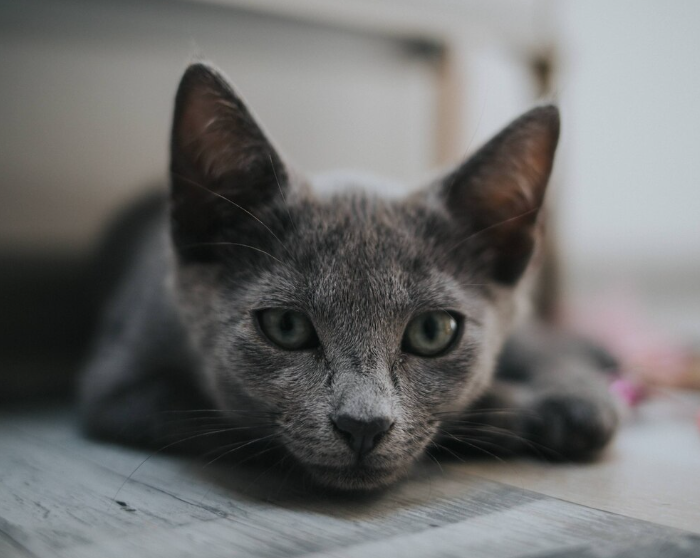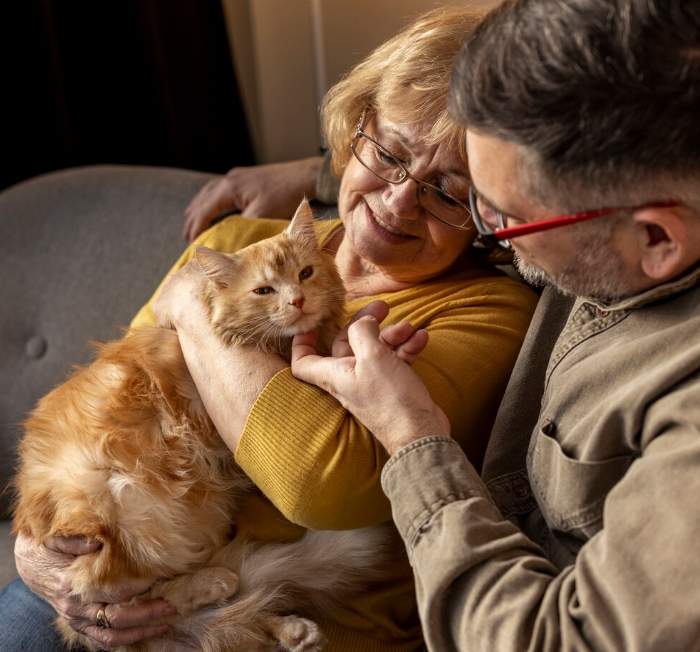2024-03-25
When we are sad or even depressed, we turn to our family members, friends, and also professionals for assistance. We try to find ways to communicate the issue we are dealing with and find a solution.
Unlike us, our pets can not simply tell us how they feel and if there is a trigger in their environment that might need to be changed or removed. Our paw friends express their emotions through their body language, including any changes in it, and vocalization.
In contrast to dogs, cats have the reputation of being more independent animals who are harder to train and whose attachment to their humans is rather a tolerance towards them instead of true love. Cats also develop very strong bonds with their human counterparts, genuinely showing them their affection and love! Along with the attachment and love they feel, there might be also negative feelings that our feline may try to express.
Signs of sadness and even depression in cats are more common than you may think. The emotional and mental state of our paw family members is as important as their physical health. Therefore, in today’s article, we will discuss what the common causes and signs of depression in cats are, and how to address depression as an issue in our beloved feline friends!
Cats enjoy having a routine, as it is related to predictability and a feeling of safety. Considering their strong affinity for routine, they might be very sensitive to any changes in their environment, including moving to a new home, getting another pet, welcoming a baby, relocating their food and water supplies, changing their diet, rearranging furniture at home, etc.
Even if certain changes may not seem important to us, this might not be the case for our feline friends.
Cats can develop strong bonds with their humans and/or other pets in the household. It could be their owner or another cat or even a dog with whom they have built a relationship.
The loss of any of these figures in their life may result in deviations from their standard behavior and signs of depression.
Common signs of depression such as lethargy and loss of appetite might result from an underlying health condition.
Health problems that are likely to cause your cat to show symptoms of depression are gastrointestinal issues, urinary tract infections, dental problems, organ failure (kidney disease, liver disease, heart disease), diabetes, anemia, arthritis, respiratory infections, and hyperthyroidism.
If your feline friend has undergone trauma and gotten injured, they may be in pain or at least feel discomfort.
Since they are unable to engage in their favorite activities such as chasing, climbing, and playing, they may show signs of sadness and depression.
Boredom might be neglected as a factor, affecting the mental health of our paw partners. Both cats and dogs who do not receive sufficient mental stimulation may develop behavioral issues as well as suffer from depression.
Having said that, before you get a pet, you should make it clear for yourself, whether you have the time and energy to commit to pet raising or not.

Cats have the reputation of being ‘greedy’ animals who can start complaining about being hungry literally a few minutes after being fed. Based on our experience, this applies to the majority of cats.
If your paw friend belongs to the group of cats, who are always hungry, and you have noticed their appetite has decreased out of a sudden, then they may be dealing with depression. However, keep in mind that loss of appetite may indicate an underlying health issue, so checking with a veterinarian is recommended.
Cats spend plenty of time throughout the day taking care of their coats. If they don’t eat, sleep, or joyfully destroy your furniture and any items left on the shelves without supervision, they are likely to groom themselves.
Having said that, any changes in their grooming routine, whether excessive grooming or lack of grooming, might be a sign of sadness. As mentioned above, deviations from our pets’ standard behavior might be caused by a health condition, so it is always advisable to talk to a professional.
If your kitty is usually full of energy, and enjoys running, chasing small animals or toys, and has abruptly become lethargic, then they may be dealing with an emotional or physical issue.
A gradual decrease in energy is a typical part of aging, however, any quick changes in your cat’s energy level need closer attention.
At the beginning of this article, we have explained that cats are creatures of habit. They enjoy routine as they pair it with predictability, and predictability means safety.
If your feline friend changes their daily routine, i.e. starts eliminating outside the litter box, no longer goes to their sleeping spot; changes their grooming habits, etc., this may indicate depression or a health problem. Changes in grooming can also be perceived as a form of deviation from the standard behavior.
Has your kitty transformed from the most loving ball of fur into a monster? It is one thing if a cat responds to your invasion of their personal space and overstepping boundaries, and another if a typically affectionate cat becomes aggressive towards people and animals without an obvious reason. Reactive behavior and signs of aggression should be taken seriously as they can be signs of an emotional or physical problem.
Looking for places to hide also indicates that there may be something wrong with your cat whether it is on an emotional or physical level. Here we would like to make a quick note for all new owners- if you have been raising a cat for a short time now, especially if the cat was stray cat, they may need time to adapt to their new living environment. Considering this, your cat may look for places to hide until you gain their trust. It usually takes a few days or a week, but the time frame varies for each cat, so you should give your feline friend time to adapt.
Each cat has their unique meowing that is used to express their emotions and needs. If you notice that your kitty has changed their vocalization or has started meowing more often or less often than usual, this may indicate they are unhappy.
Purring can not only indicate happiness in cats but can also be perceived as a tool that cats use to comfort themselves when they are stressed, injured, or otherwise unwell.
True cat lovers know the risks of raising a feline friend, especially when it comes to scratching. We try to provide our beloved cats with various surfaces so they can satisfy their need to scratch. They scratch for various reasons, including maintaining their claws, stretching their muscles, releasing tension, or marking their territory through scent.
If your cat’s scratching becomes excessive, this might indicate they are stressed and unhappy.

It may seem to be an obvious thing to do but it is not so simple. Engulfed in our dynamic daily schedules, we may forget to spend valuable time with our pets. Engaging in quality playtime; providing them with mentally stimulating toys so they are engaged while we are not at home; and petting them while also respecting their boundaries are among the activities that will keep your feline friend busy, and will also contribute to strengthening your bond.
Although cats are considered more independent than dogs, this does not mean they don’t need us.
If any triggers in your cat’s environment may cause them stress and anxiety, make sure to remove these or work on your cat’s ability to accept them.
Widely used in dog training, positive reinforcement and desensitization can have a great positive impact on cats too.
Positive reinforcement involves rewarding your feline friend with their favorite treats when they show wanted behaviors. Praising and petting are also types of positive reinforcement, that can be used in conjunction with food. Through positive reinforcement, you can encourage your kitty to display positive behaviors and engage in activities.
Desensitization, on the other hand, means gradually exposing the cat to the triggers in the environment, while pairing the triggers with a positive experience. For example, if your cat is afraid of a specific object at home, you can place it at a distance and let them gradually get used it to. Encourage your cat's interest in the object by rewarding them when they paw at it, sniff it, or lick it.
The same applies to noises, i.e. the noise of the vacuum cleaner. Place the vacuum cleaner (while turned off) near your cat’s bedding or supplies. Give them time to explore it while rewarding them for showing interest. Then, you can turn it on for a short time (you can keep it at a distance) and reward your kitty for remaining calm.
Setting up a personal area for your cat might also be rewarding along with applying the training approaches listed above. Cats have different personalities and levels of boundaries. Your paw friend might be very cuddly, eager to receive your attention, and either clingy or rather independent, showing affection only in specific cases. Regardless of what type your cat is, they would appreciate having their personal space at home.
They might use it when they want to retreat, rest, and feel secure. Providing a designated space for your cat can help reduce stress and anxiety, especially in multi-pet households or in homes with a lot of activity.
Since cats thrive on routine, you should try making a schedule. It might include mealtime, playtime, grooming time, etc. It will bring a feeling of safety and comfort to your kitty.
If there are any upcoming changes, you should try making these as smoothly and gradually as possible.
Putting your cat on a balanced diet, adapted to their age, health, and activity level will contribute to improving their overall well-being.
This will also positively affect their mental health and energy levels and might mitigate the symptoms of stress and depression.
Most cats are attracted to catnip as it contains nepetalactone, which is believed to mimic the effects of certain feline pheromones.
Catnip is known for its calming effect on cats, so it might be a great option for cats who are stressed. However, it is essential to do a quick test first and see how your cat will respond to this plant.
Also, contacting a veterinarian regarding the safe amount to use, is recommended.
Your feline friend may need a companion throughout the day if they feel lonely.
However, this is a decision that should not be taken lightly! Cats tend to be territorial and may also display preferences towards certain species. For instance, your feline friend might be more welcoming to a dog than to another cat. If you opt for a second cat, then both pets should have matching temperaments. Gradual introduction of the new pet is highly recommended should you decide to make this step.
Last but not least, make sure to provide separate supplies for each of your pets so that they don’t have to compete for resources.
As we have already mentioned, consultation with a veterinarian is necessary, should you notice any changes in your cat’s behavior.
It is always better to be extra cautious and exclude potential underlying health conditions than putting your feline friend’s health at risk.